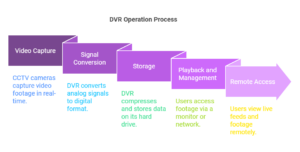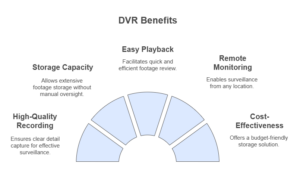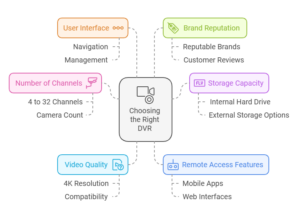Understanding DVR: The Backbone of Modern Surveillance Systems
In today’s world, security is a top priority for both homes and businesses. With the rise of technology, surveillance systems have evolved significantly, and one of the key components of these systems is the Digital Video Recorder (DVR). In this blog post, we will explore what a DVR is, how it works, its benefits, and its role in enhancing security.
What is a DVR?
A Digital Video Recorder (DVR) is an electronic device that records video in a digital format to a storage device, such as a hard drive, USB flash drive, or cloud storage. DVRs are commonly used in conjunction with CCTV cameras to capture and store video footage for later viewing. Unlike traditional analog systems, which use tapes for recording, DVRs provide a more efficient and reliable way to manage video data.
How Does a DVR Work?
DVRs work by receiving video signals from connected cameras, converting these signals into a digital format, and then storing them on a hard drive. Here’s a step-by-step breakdown of the process:

-
Video Capture: CCTV cameras capture video footage in real-time. These cameras can be analog or digital, but most modern systems use digital cameras for better quality.
-
Signal Conversion: The DVR receives the video signals from the cameras. If the cameras are analog, the DVR converts the analog signals into digital format. Digital cameras send their signals in a digital format, which the DVR can process directly.
-
Storage: Once the video is in digital format, the DVR compresses the data to save space and stores it on its internal hard drive. The amount of footage that can be stored depends on the hard drive’s capacity and the video quality settings.
-
Playback and Management: Users can access the recorded footage through a connected monitor or remotely via a network. DVRs often come with user-friendly interfaces that allow for easy navigation, searching, and playback of recorded videos.
-
Remote Access: Many modern DVRs offer remote access capabilities, allowing users to view live feeds and recorded footage from their smartphones, tablets, or computers.
Check Out:
Benefits of CCTV Camera for Business Security
Benefits of Using a DVR

-
High-Quality Recording: DVRs provide high-resolution video recording, ensuring that every detail is captured clearly. This is crucial for identifying individuals or events in security footage.
-
Storage Capacity: With large hard drives, DVRs can store weeks or even months of footage, depending on the settings and the number of cameras connected. This allows for extensive monitoring without the need for constant manual oversight.
-
Easy Playback: DVRs come with intuitive interfaces that make it easy to search for specific events or time frames. Users can quickly find and review footage when needed.
-
Remote Monitoring: Many DVRs support remote access, enabling users to monitor their property from anywhere in the world. This feature is particularly beneficial for business owners who want to keep an eye on their premises while away.
-
Cost-Effective: Compared to cloud storage solutions, DVRs can be a more cost-effective option for storing video footage, especially for businesses that require extensive surveillance.
-
Integration with Other Security Systems: DVRs can be integrated with other security systems, such as alarms and access control systems, providing a comprehensive security solution.
Choosing the Right DVR
When selecting a DVR for your home or business, consider the following factors:

-
Number of Channels: Determine how many cameras you plan to install. DVRs come in various channel configurations, typically ranging from 4 to 32 channels.
-
Storage Capacity: Assess how much footage you need to store. Look for DVRs with larger hard drives or the option to add external storage.
-
Video Quality: Choose a DVR that supports the resolution of your cameras. For example, if you have 4K cameras, ensure the DVR can record in 4K quality.
-
Remote Access Features: If remote monitoring is important to you, select a DVR that offers robust remote access capabilities through mobile apps or web interfaces.
-
User Interface: A user-friendly interface can make a significant difference in how easily you can navigate and manage your recordings.
-
Brand Reputation: Opt for reputable brands known for their reliability and customer support. Reading reviews and seeking recommendations can help you make an informed choice.
Conclusion
In conclusion, a Digital Video Recorder (DVR) is an essential component of modern surveillance systems, providing high-quality video recording, extensive storage, and easy access to footage. Whether for home security or business monitoring, investing in a reliable DVR can significantly enhance your security measures. By understanding how DVRs work and their benefits, you can make an informed decision when selecting the right system for your needs. With the right DVR in place, you can enjoy peace of mind knowing that your property is being monitored effectively.